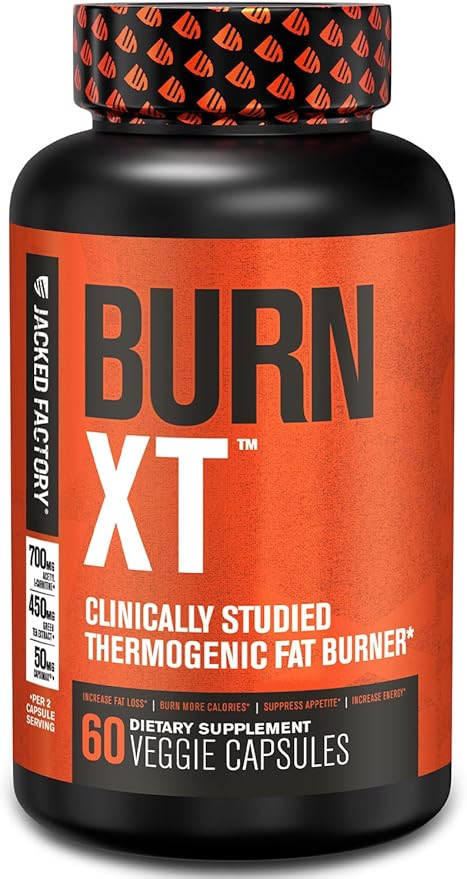Whats The deal with fat burners? good or bad?
In the world of fitness and weight loss, fat burners are a hot topic. They are marketed as “thermogenics” or “metabolism boosters.” They promise to help you lose fat, boost energy, and improve performance. But, are they really safe and effective?
We will look into how fat burners work, their benefits, and the risks. This will help you understand them better.
Featured Products
Jacked Factory Burn-XT
Lean Joe Bean Superfood Coffee
Instant Knockout Fat Burner for Men
Burn Pro 7-in-1 Thermogenic Metabolism Booster
TransparentLabs Body Recomp Fat Burner
Hydroxycut Hardcore
Common Ingredients in Fat Burners
Fat burners are composed of a variety of ingredients, each designed to target fat loss in a different way. Common ingredients include:
- Caffeine: A stimulant that boosts metabolism and increases energy.
- Green Tea Extract: Contains antioxidants like EGCG that may enhance fat burning.
- L-Carnitine: Helps the body turn fat into energy.
- Capsaicin: Found in chili peppers, it may increase thermogenesis (heat production).
- Conjugated Linoleic Acid (CLA): A fatty acid that might assist in fat loss.
Yohimbine: An extract from the Yohimbe tree bark, Yohimbine is known to increase fat release from fat cells, particularly during exercise. It can also act as an appetite suppressant but may cause jitters or anxiety in some people.
Synephrine (Bitter Orange): A natural stimulant found in bitter orange, Synephrine is often used as an alternative to ephedrine. It can boost metabolism and increase fat breakdown but may lead to increased heart rate and blood pressure.
- Forskolin: Extracted from the Indian Coleus plant, Forskolin may help increase cellular levels of cyclic AMP (cAMP), which can boost fat loss and preserve lean muscle mass.
Raspberry Ketones: Raspberry Ketones are compounds found in red raspberries that are thought to increase the breakdown of fat cells and boost levels of adiponectin, a hormone that regulates metabolism.
Types of Fat Burners
- Thermogenic Fat Burners: Increase heat production, promoting calorie burn.
- Appetite Suppressants: Reduce hunger, helping with calorie control.
- Carb Blockers: Prevent the digestion of carbohydrates, reducing calorie intake.
- Fat Blockers: Inhibit fat absorption from food
How Do Fat Burners Work?
Mechanism of Action
Fat burners work by leveraging specific ingredients to increase energy expenditure, reduce cravings, or block fat absorption. Some ingredients like caffeine increase the metabolic rate, leading to more calories burned, while others, like fiber supplements, help control appetite.
Scientific Evidence
Studies provide mixed results on fat burner effectiveness. For instance, some research suggests that green tea extract may increase fat oxidation during exercise, while other studies question the long-term impact of such supplements. It’s essential to consider the scientific evidence before choosing a fat burner.
Natural vs. Synthetic Fat Burners
Natural fat burners, like green tea and capsaicin, often have fewer side effects but may be less potent. Synthetic fat burners can offer quicker results but may come with greater risks.
Potential Benefits of Fat Burners
Boost in Metabolic Rate
Some fat burners, particularly thermogenic ones, claim to increase your basal metabolic rate (BMR), which can help you burn more calories throughout the day, even at rest.
Increased Energy Levels
Ingredients like caffeine and synephrine can provide an energy boost, making it easier to engage in intense workouts that burn more calories.
Appetite Suppression
Certain fat burners contain appetite-suppressing ingredients, such as Glucomannan, a water-soluble fiber that expands in the stomach to help you feel fuller for longer.
Quick Short-term Results
Fat burners may offer a temporary boost in weight loss, especially when combined with a healthy diet and exercise regimen. They can be helpful for kickstarting a weight loss journey or breaking through a weight loss plateau.

The ‘All-Natural’ Label
Natural doesn’t always mean safe. Ingredients like bitter orange may be “natural” but can still pose risks. Always research each component and look for scientific backing.
Side Effects are Minimal
While some believe side effects are rare, it’s crucial to be aware of potential negative impacts, especially if the supplement contains stimulants.

Potential Risks and Side Effects
Common Side Effects
Using fat burners can lead to:
- Jitters or Shakiness from high caffeine content.
- Digestive Issues such as bloating or nausea.
- Increased Heart Rate due to stimulants.
Serious Health Risks
Potential severe risks include:
- Heart Palpitations or High Blood Pressure for those sensitive to stimulants.
- Sleep Disturbances and anxiety if consumed late in the day.
- Liver Damage has been associated with some fat burners containing unproven or banned substances.
Interactions with Medications
If you are on medication, consult a healthcare professional. Ingredients like caffeine can interfere with prescriptions, especially those for heart conditions.
Are Fat Burners Effective?
Short-Term vs. Long-Term Results
Fat burners may offer rapid results for short-term weight loss, but their long-term efficacy remains debatable. Most fat burners have a diminishing return over time, making them better suited for short bursts.
Impact on Exercise Performance
Some fat burners can enhance workout performance by increasing energy levels, but others may cause dehydration or fatigue if not taken properly. A good diet often has a similar or better impact on performance without side effects.
Results Without a Balanced Diet and Exercise
Fat burners cannot replace a healthy lifestyle. For sustainable fat loss, a combination of balanced nutrition, strength training, and cardio is essential.
Who Should Avoid Fat Burners?
Pre-existing Health Conditions
People with heart conditions, high blood pressure, or anxiety should avoid fat burners due to their stimulant content.
Pregnant or Nursing Women
Pregnant and nursing women should steer clear of fat burners, as they may pose risks to both mother and baby.
Sensitive to Stimulants
If you are sensitive to caffeine or similar stimulants, it’s best to avoid thermogenic fat burners and consider natural alternatives.
Natural Alternatives to Fat Burners
Whole Foods and Spices
Natural fat-burning foods include:
- Cayenne Pepper: Increases thermogenesis.
- Green Tea: Contains catechins that may support fat loss.
- Ginger: Aids digestion and promotes a healthy metabolism.
Healthy Habits for Weight Loss
Focus on a balanced diet, regular exercise, and quality sleep. Natural weight loss may be slower but is more sustainable.
Herbal and Non-stimulant Supplements
Consider herbs like Rhodiola Rosea and fiber supplements that provide a more gentle approach to weight loss without harsh side effects.
Tips for Safe Use of Fat Burners
- Start With a Lower Dosage: Test tolerance by starting small, especially with stimulant-based products.
- Cycle Usage: Use fat burners in cycles (e.g., 4 weeks on, 2 weeks off) to prevent dependency and reduce tolerance.
- Monitor Your Body’s Response: Keep an eye out for side effects and adjust accordingly.
- Consult a Healthcare Professional: Always consult a doctor before beginning any fat burner, particularly if you have pre-existing conditions.
Final Verdict: Are Fat Burners Worth It?
Pros and Cons Recap
Fat burners have their benefits and drawbacks. They may assist in short-term weight loss but are not a long-term solution without lifestyle changes. Consider whether the benefits outweigh the risks for your specific situation.
Who Might Benefit Most from Fat Burners?
Fat burners may be beneficial for those looking to kickstart weight loss or overcome a plateau, but they are not necessary for everyone.
Alternatives to Consider
Focus on whole foods, proper exercise, and lifestyle adjustments for a sustainable and healthy weight loss journey.
FAQ Section
- Can Fat Burners Replace a Healthy Diet?
No, fat burners should supplement, not replace, a balanced diet and exercise. - What Happens if I Stop Taking Fat Burners?
You may notice a decrease in energy, and if diet and exercise aren’t maintained, weight may return. - How Quickly Can I Expect to See Results?
Results vary, but most see changes within 2-4 weeks if combined with a healthy lifestyle. - Are There Any Safe Fat Burners?
Yes, some fat burners with natural ingredients are considered safer. However, safety is individual. - How Do I Choose the Right Fat Burner?
Research ingredients, read reviews, and consult a healthcare professional to find a suitable option.
Conclusion
Fat burners aren’t inherently good or bad. They may provide a helpful boost in a structured weight loss plan but are not a miracle solution. A healthy, balanced approach remains the best strategy for sustainable weight management.
Thanks For Reading!


